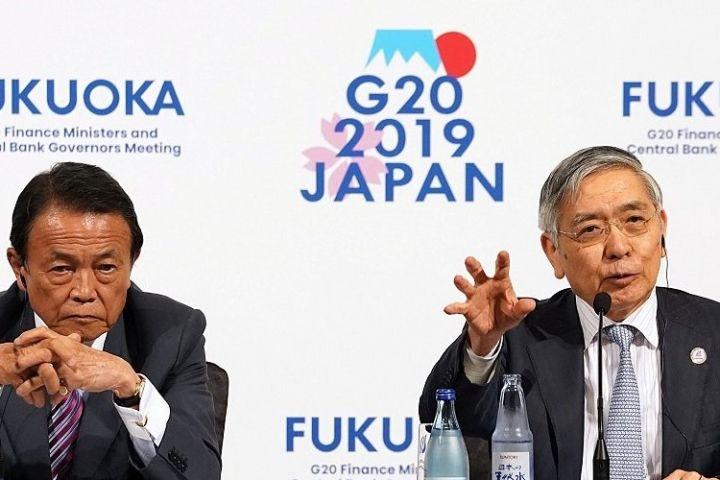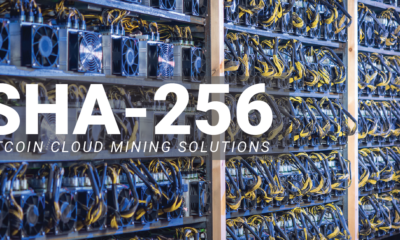Bitcoin
G20 Finance Chiefs Endorse ‘Draconian’ Crypto Trading Measures

Finance ministers and central bank chiefs from the Group of 20 (G20) major economies asked international organizations to monitor risks and consider work on additional multilateral responses as needed, and showed support to the ‘draconian’ KYC-related suggestions that would affect virtual asset service providers and their clients.
Ministers and central bank governors met this past weekend in Fukoka, Japan, ahead of the meeting of the leaders of the G20 in Osaka on June 28-29.
The communiqué, or joint announcement reiterated previous statements that crypto-assets can deliver “significant benefits to the financial system and the broader economy” but governments need to remain vigilant, despite this new type of assets still does not pose a threat to global financial stability. Also, not mentioning crypto specifically, the communiqué repeated that they welcome “the recent progress on addressing the tax challenges arising from digitalization” and they “will redouble our efforts for a consensus-based solution with a final report by 2020.”
Meanwhile, in the crypo-related section, the ministers and governors ‘welcomed’ a few reports by international organizations that might shape regulation of the cryptoverse.
What are those and what do they say?
“We reaffirm our commitment to applying the recently amended FATF Standards to virtual assets and related providers for AML [anti-money laundering] and CFT [ countering the financing of terrorism]. We look forward to the adoption of the FATF Interpretive Note and Guidance by the FATF at its plenary later this month.”
What does it mean?
As reported by Cryptonews.com, the intergovernmental Financial Action Task Force on Money Laundering (FATF) prepared a draft recommendation, which suggests that all virtual asset service providers (VASPs) will have to be licensed and do a KYC (know your customer) check on every single transaction, incoming or outgoing, that is above either EUR 1,000 or USD 1,000.
However, this part of the draft, deemed as ‘draconian’ by the industry, is not guaranteed to make it into the final version, and will be discussed at the G20 meeting in the end of June.
___
“We welcome IOSCO’s work on crypto-asset trading platforms related to consumer and investor protection and market integrity.”
What does it mean?
“The Board of the International Organization of Securities Commissions is now seeking comments on a consultation paper that describes the issues associated with crypto-asset trading platforms (CTPs) and sets forth key considerations to assist regulatory authorities in addressing these issues.”
“These key considerations relate to:
•Access and on-boarding;
•Safekeeping of participant assets, including custody arrangements;
•Identification and management of conflicts of interest;
•Transparency of operations;
•Market integrity, including the rules governing trading on the CTP, and how those rules are monitored and enforced;
•Price discovery mechanisms;
•Technology, including resiliency and cyber security.”
IOSCO welcomes comments on or before 29 July 2019.
__
“We welcome the FSB’s [Financial Stability Board] directory of crypto-asset regulators, and its report on work underway, regulatory approaches and potential gaps relating to crypto-assets.”
What does it say?
“The report notes that gaps may arise in cases where such assets are outside the perimeter of market regulators and payment system oversight.”
“The report concludes with the recommendation that the G20 keep the topic of regulatory approaches and potential gaps, including the question of whether more coordination is needed, under review.”
__
“We also welcome the FSB report on decentralized financial technologies, and the possible implications for financial stability, regulation and governance, and how regulators can enhance the dialogue with a wider group of stakeholders.”
What does the report say?
“The report notes that the application of decentralised financial technologies – and the more decentralised financial system to which they may give rise – could benefit financial stability in some ways. It may also lead to greater competition and diversity in the financial system and reduce the systemic importance of some existing entities. At the same time, the use of decentralised technologies may entail risks to financial stability. These include the emergence of concentrations in the ownership and operation of key infrastructure and technology, as well as a possible greater degree of procyclicality in decentralised risk-taking. New uncertainties concerning the determination of legal liability and consumer protection may also affect public trust in the financial system. Recovery and resolution of decentralised structures may be more difficult.”

-

 Press Release3 years ago
Press Release3 years ago5 best crypto exchanges of 2022
-

 Press Release5 years ago
Press Release5 years agoBlockchain Applications made Simpler with Dappatoz
-

 Press Release4 years ago
Press Release4 years agoMeet TABOO, the unique token that gives reward for every transaction
-

 Press Release5 years ago
Press Release5 years agoCloud Mining: How Multimine is Making Crypto Mining Operation More Seamless.
-

 Press Release5 years ago
Press Release5 years agoSHA-256 – The best combination of Bitcoin mining, Cloud, and affordable Hash Power
-

 Press Release6 years ago
Press Release6 years agoLISTING OF LEVL ON A SECOND EXCHANGE
-

 Bitcoin6 years ago
Bitcoin6 years agoBitcoin’s Gravity: How Idea-value Feedback Loops Are Pulling People in
-

 Press Release5 years ago
Press Release5 years agoEXMR FOUNDATION NETWORK “LABS OF DAPPS & PROJECTS” MORE INFO.



